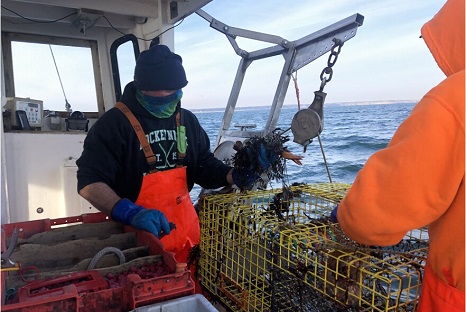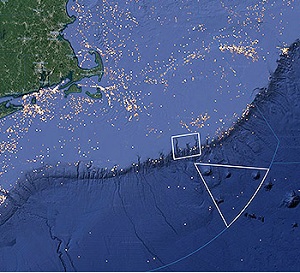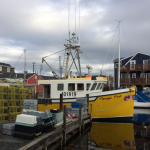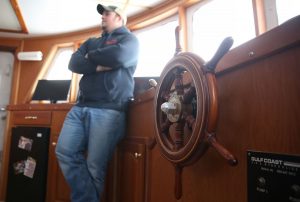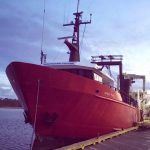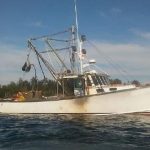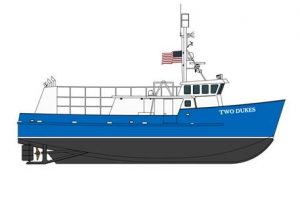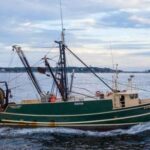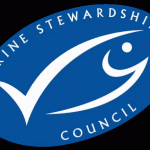Tag Archives: Massachusetts Lobstermen’s Association
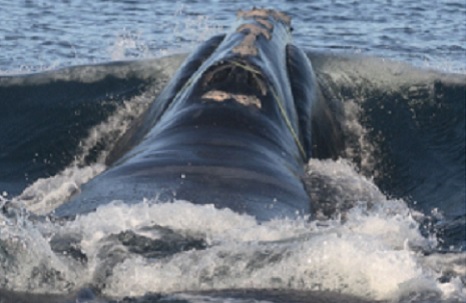
Massachusetts fishermen say feds are hypocritical in Gulf of Maine wind energy designation
A move to designate two million acres in the Gulf of Maine as a hub for wind energy is snagging a sharp hook from Massachusetts fishermen who say the development overlooks risks to the North Atlantic right whale. A handful of Bay State fishermen advocacy groups are teaming with counterparts from across New England in criticizing the Biden administration’s plans to industrialize the area off the coasts of Massachusetts, New Hampshire and Maine. Fishermen, however, say the industrialization of the two-million-acre area is “flatly inconsistent with a policy of endangered species protection.” “Fishermen are disheartened that the WEA designation favors foreign energy developers over marine mammal protection,” the Gulf of Maine Fishing Associations said in a statement last week. “This preferential treatment is in stark contrast to the federal government’s aggressive campaign to burden commercial fishing needlessly with crushing restrictions to protect whales.” more, >>click to read<< 08:43
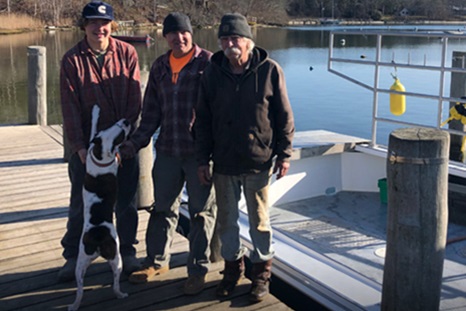
Wind turbines and a shadow over Island fishers
Their boat is named Redemption. And as seventeen-year-old Tegan Gale walked onto the lobster boat docked at Tashmoo landing on a warm March Day, he was thinking about what the boat meant to him and about his future. Tegan says he loves being out on the water, and he wants to keep the family tradition alive, but he’s up against what he sees as big business and a lot of uncertainty. And now, there’s another layer of uncertainty: the new offshore wind industry. Tegan isn’t alone. Several Island fishermen say the new industry has the potential to disrupt their work for years to come. They have questions about the impacts of underwater cables extending from the turbines and dragging nets over the high-voltage wires. They also have fears about the impact to sea life during construction of the offshore wind farms. more, >>click to read<< 13:26
Judge dismisses lobster lawsuit, U.S.-caught crustaceans remain on
 A California judge has dismissed a case filed by local lobstermen who called foul after a seafood watch group put the fishery on a” Red List” for its impact on critically endangered right whales. The California-Based Monterey Bay Aquarium and the Marine Stewardship Council pointed to trap/pot fishing gear used to catch lobsters that has been blamed for the deaths of critically endangered right whales. The “Red List” decision pushed Whole Foods, Hello Fresh, Blue Apron, and others to stop selling the shellfish caught in U.S. waters. In March, four Massachusetts lobstermen, Arthur Sawyer, Jarret Drake, Eric Meschino, and Bill Souza, filed a class action lawsuit saying the conservationists’ move caused monetary harm. But Judge Beth Labson Freeman wrote that they didn’t establish this as a class action lawsuit. more, >>click to read<< 10:43
A California judge has dismissed a case filed by local lobstermen who called foul after a seafood watch group put the fishery on a” Red List” for its impact on critically endangered right whales. The California-Based Monterey Bay Aquarium and the Marine Stewardship Council pointed to trap/pot fishing gear used to catch lobsters that has been blamed for the deaths of critically endangered right whales. The “Red List” decision pushed Whole Foods, Hello Fresh, Blue Apron, and others to stop selling the shellfish caught in U.S. waters. In March, four Massachusetts lobstermen, Arthur Sawyer, Jarret Drake, Eric Meschino, and Bill Souza, filed a class action lawsuit saying the conservationists’ move caused monetary harm. But Judge Beth Labson Freeman wrote that they didn’t establish this as a class action lawsuit. more, >>click to read<< 10:43
Interview: Massachusetts lobstermen want to invent a better lobster trap
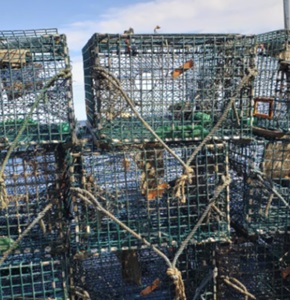 For years, right whale advocates and engineers have been trying to develop new lobster fishing gear designed to prevent whales from entanglements. But most local lobstermen say they’re against this so-called “on demand” fishing gear that’s been created. Now, as CAI’s Eve Zuckoff reports, lobstermen have decided to come up with their own technology. Eve, you were the first to report this, thanks for being here this morning. Eve Zuckoff: Thanks for having me. Patrick Flanary: So the Massachusetts lobstermen’s association has just been awarded a $1.2 million grant to develop new fishing gear. What’s their proposal? more, >>click to read<< 09:47
For years, right whale advocates and engineers have been trying to develop new lobster fishing gear designed to prevent whales from entanglements. But most local lobstermen say they’re against this so-called “on demand” fishing gear that’s been created. Now, as CAI’s Eve Zuckoff reports, lobstermen have decided to come up with their own technology. Eve, you were the first to report this, thanks for being here this morning. Eve Zuckoff: Thanks for having me. Patrick Flanary: So the Massachusetts lobstermen’s association has just been awarded a $1.2 million grant to develop new fishing gear. What’s their proposal? more, >>click to read<< 09:47
New England lobstermen threaten to sue feds over planned Massachusetts fishing closure
 NOAA is looking to permanently add a wedge between state and federal waters to an existing closure that stretches roughly 9,000 square miles off the Massachusetts coast, a measure feds have put in place to preserve the North Atlantic right whale. An emergency rule prohibited trap and pot fishery buoy lines on the wedge during the past two years, but the feds are looking to make the zone permanent and have the backing of the Massachusetts Division of Marine Fisheries. The proposed permanent expansion to the Massachusetts Restricted Area has caught lobstermen by surprise. Dustin Delano, chief operating officer of the New England Fishermen’s Stewardship Association, took exception to the “recklessness” of the proposal after an amendment was included in this year’s $1.7 trillion federal spending bill that looked to delay protections for the North Atlantic right whale by six years. >>click to read<< 11L27
NOAA is looking to permanently add a wedge between state and federal waters to an existing closure that stretches roughly 9,000 square miles off the Massachusetts coast, a measure feds have put in place to preserve the North Atlantic right whale. An emergency rule prohibited trap and pot fishery buoy lines on the wedge during the past two years, but the feds are looking to make the zone permanent and have the backing of the Massachusetts Division of Marine Fisheries. The proposed permanent expansion to the Massachusetts Restricted Area has caught lobstermen by surprise. Dustin Delano, chief operating officer of the New England Fishermen’s Stewardship Association, took exception to the “recklessness” of the proposal after an amendment was included in this year’s $1.7 trillion federal spending bill that looked to delay protections for the North Atlantic right whale by six years. >>click to read<< 11L27
Lawsuit challenges new limits on offshore lobster traps
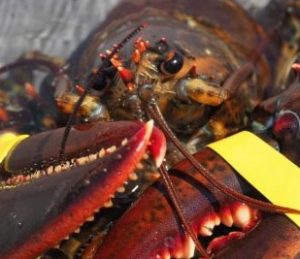 A New Hampshire lobster boat and a lobstermen’s association have filed a federal lawsuit to stop changes that would decrease the number of traps that can be used. The changes are for Area 3, which is about 30 miles offshore and runs up to the Canadian border down to the Carolinas. “That’s what this is supposed to be about, conservation of the resource,” Arthur “Sooky” Sawyer, president of the Massachusetts Lobstermen’s Association, said. Video, >>click to read<< 07:02
A New Hampshire lobster boat and a lobstermen’s association have filed a federal lawsuit to stop changes that would decrease the number of traps that can be used. The changes are for Area 3, which is about 30 miles offshore and runs up to the Canadian border down to the Carolinas. “That’s what this is supposed to be about, conservation of the resource,” Arthur “Sooky” Sawyer, president of the Massachusetts Lobstermen’s Association, said. Video, >>click to read<< 07:02
Visit us at The Massachusetts Lobstermen’s Association Annual Weekend & Industry Trade Show
The Massachusetts Lobstermen’s Association Annual Weekend & Industry Trade Show will be held March 23-26 , 2023 at the Resort and conference Center at Hyannis, 35 Schudder Ave., Hyannis, MA 02601 Details. >click to read< 11:27
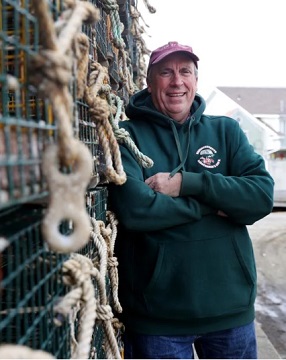
California sustainability group told people to stop eating lobster, so Massachusetts lobstermen file suit
Standing on a dock in his hometown of Gloucester, Mass., lobsterman Arthur Sawyer looked out at the peaceful, calm waters off of Cape Ann. Sawyer, president of the Massachusetts Lobstermen’s Association, and three other Bay State lobster fishers filed a class action lawsuit earlier this month against Monterey Bay Aquarium and the international Marine Stewardship Council, groups that consider lobstering a major risk to North Atlantic right whales and, hence, people shouldn’t buy lobsters anymore. “They have gone overboard targeting Massachusetts when we’ve been doing everything,” Sawyer told the Herald. “We have 100 percent closure right now. There is no place safer for right whales right now on the east coast than in Massachusetts waters.” >click to read< 11:12

In class action lawsuit, Massachusetts lobstermen fight efforts to ‘red list’ their catch
Four Massachusetts lobstermen have filed a class action suit against the Monterey Bay Aquarium and Marine Stewardship Council, groups that urged distributors and grocery stores to avoid purchasing lobster because of the fishery’s impact on North Atlantic right whales. “We’ve always been like the punching bag for, like, the whale people. So I’m glad we’re finally striking back,” said plaintiff Jarrett Drake, a lobsterman who fishes out of New Bedford, “because it gives us a chance to try to at least defend ourselves.” “When [Montery Bay Aquarium] chooses to tag a product as one to be avoided (“red-list”) on Seafood Watch, it acts with near certainty that the companies it collaborates with will immediately discontinue that product,” the plaintiffs say in their complaint. >click to read< 08:35

Federal court hears arguments from Maine lobstermen appealing right whale regulations
A federal appeals court heard arguments Friday from the Maine Lobstermen’s Association, which is challenging a government plan to regulate the fishery and conserve endangered right whales. The Maine Lobstermen’s Association had promised to take its latest appeal of federal fishing regulations all the way to the U.S. Supreme Court, if necessary. But lobstermen hope they’ll avoid that prospect, especially with Paul Clement, an attorney with more than 100 past Supreme Court appearances, representing Maine. >click to read< 07:22
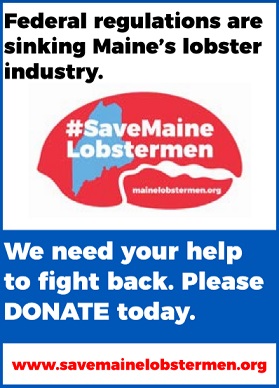
MLA back in court this month over federal lobstering rules
The Maine Lobstermen’s Association continues its court fight against the National Marine Fisheries Service, challenging its biological opinion for the endangered right whale, released in May 2021, and the science used to inform it. The MLA lost its original lawsuit in Sept. 2022 but was granted the right to appeal. Oral arguments are scheduled for Feb. 24 in the U.S. Court of Appeals in the District of Columbia. The Maine Department of Marine Resources and the Maine Lobstering Union Lodge 207, the Massachusetts Lobstermen’s Association, are intervenors in the case. “[The six-year delay] just really amplifies the concerns that the MLA has had,” MLA executive director Patrice McCarron said. “It highlights and exemplifies the importance of the work we’ve done and the importance of letting the lawsuit run its course.” >click to read< 09:23

On The Ropes – Federal court rules against lobster industry in appeal of whale protection regulations
“Obviously, it’s devastating to the lobster industry,” Stonington Town Manager Kathleen Billings told the Islander. Stonington lands by far the most lobsters in the state. In total, Maine lobstermen added an estimated $724,949,426 worth of lobster landings to the state commercial fishery in 2021. “We have a lot at stake,” Billings continued. “[Lobstering] makes up $60 [million] to $70 million to our economy and to have this recent ruling, and also too with the Seafood Watch list designation, they pretty much put a torch to our industry and burnt it to the ground for us.” >click to read< 08:55

U.S. District Court Judge James E. Boasberg rejects bid to block to new lobstering rules
A federal judge on Thursday shot down a challenge by lobstering groups to federal rules intended to protect endangered North Atlantic right whales. U.S. District Court Judge James E. Boasberg rejected a bid by the Maine Lobstermen’s Association, the Massachusetts Lobstermen’s Association and the state of Maine to block federal regulators from imposing new limits on where and how lobstermen can fish in federal waters. The court, which had previously ruled that new federal regulations didn’t go far enough in protecting right whales, said Thursday that the state and lobstering groups couldn’t delay or derail the regulations. Boasberg rejected the lobstering groups’ contention that the National Marine Fisheries Service’s regulations overstated the risk that lobstering posed to the whales and overregulated the industry. >click to read< 20:04
Governor Mills Blasts Federal Court Decision in Lawsuit Challenging Federal Regulations Hurting Maine’s Vital Lobster Industry >click to read<

Fishery interests urge judge to rule in lobster lawsuit
Parties in a lobster industry lawsuit filed against federal regulators are urging a judge to make a decision in the case because its outcome affects a parallel case that the parties have to act on. The federal judge considering this decision was the same who ruled last month that new regulations to protect endangered right whales do not go far enough and violate both the Endangered Species Act and Marine Mammal Protection Act. In that case, U.S. District Judge James Boasberg asked the parties to propose remedies. The lobster association’s case takes aim at newly enacted and proposed federal regulations to protect the whales, which the association says are invalid because they are based on flawed assumptions and calculations. The parties need to know the court’s opinion so they can develop proposed remedies that Boasberg ordered in the parallel lawsuit brought by conservation groups. >click to read< 17:01

Massachusetts: New relief fund would buoy lobster industry
A proposed state fund would provide financial relief to commercial lobstermen whose livelihoods are being impacted by state and federal regulations aimed at protecting critically endangered north Atlantic right whales. Tucked into a $52.7 billion state budget awaiting action by Gov. Charlie Baker is a proposal to create a new grant program with $500,000 in initial funding. The plan calls for providing grants of up to $5,000 to licensed lobstermen to help offset the cost of purchasing new gear and equipment needed to comply with the new whale protection rules. The grant money must be distributed in a “geographically equitable manner” under the proposal. Senate minority leader Bruce Tarr, R-Gloucester, who pushed for the funding, said it will help buoy lobstermen who are struggling to afford the expense of upgrading their gear and equipment. >click to read< 17:50

Massachusetts weighs relief fund to the lobster industry
Lawmakers want to create a new fund to help commercial lobstermen whose livelihoods are being impacted by state and federal regulations aimed at protecting critically endangered North Atlantic right whales. An amendment added to the Senate version of the $49.7 billion state budget, approved Thursday, May 26, would set up a lobstering closure mitigation fund through the state’s unemployment system with at least $12 million in initial funding. The amendment was co-sponsored by Sens. Bruce Tarr, R-Gloucester, and Patrick O’Connor, R-Weymouth, who say the move will provide “much needed relief” for the lobster industry. “It is absolutely critical that we provide relief to the people in this industry which is so important to the commonwealth,” Tarr said. “As the second largest provider of lobster in the nation these workers are needed for another day, another year, and another generation.” >click to read< 08:03

Broad right whale regulations decried by Massachusetts lobster industry
Lobster industry representatives and conservationists are pondering regulations aimed at protecting right whales, which continue to hamper Massachusetts fishermen causing months of lost income. Since 2015, lobstermen have had to work around area restrictions prohibiting fishing in gillnet fisheries during the time right whales are often present. So far, the Bay State has reduced its risk to right whales by 92% through a suite of measures including closures, weak rope, line diameter restrictions and trawling up, Casoni said. >click to read< 11:11
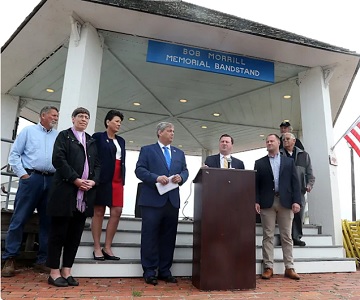
Massachusetts: Lawmakers want to pay lobstermen during right whale conservation closure
State senators next week will debate a plan by South Shore lawmakers to pay lobstermen during a months-long annual fishing closure advocates say cuts income of some fishermen by as much as half each year. State senators Patrick O’Connor and Bruce Tarr have filed a budget amendment that would allocate $12 million to pay lobstermen $1 per week per trap they are licensed for during time they are not allowed to fish. The state annually shuts down more than 9,000 square miles of water for at least three months in efforts to protect migrating right whales. > click to read < 08:28

Gulf of Maine: Lawsuits over North Atlantic right whale regulations coming to boil
Lobsterman Brian Cates lives so far at the edge of Maine he can look out the windows of his house and see Canadian boats out in Canadian waters. Cates and other New England lobstermen are worried about how the coming regulations issued by the National Marine Fisheries Service will affect their livelihoods. Cates fishes in disputed waters. There, around the mouth of the Bay of Fundy, there’s a strip of ocean claimed by both Canada and U.S. alike called the grey zone. Cates fishes up against Canadian lobstermen, their traps and lines often getting caught up on one another. And the rules coming down from the federal government are not helping, >click to read< 19:14
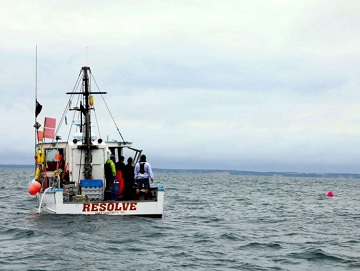
Despite threats from fellow fishermen, Mass lobstermen press to allow ropeless fishing in closed areas
The lobstermen viewed themselves as trailblazers, even calling themselves “Pioneers for a Thoughtful Coexistence”. In an effort to prove that there’s a way for their industry to resume fishing in coastal waters where Massachusetts banned lobstering to protect endangered whales, they have asked regulators to allow them to set their traps without vertical buoy lines. “I’ve been trying my best to get our guy’s back fishing,” said Michael Lane, 46, a lobsterman who fishes 800 traps out of Cohasset. But when Lane’s group presented at a recent public hearing their proposal to fish with experimental rope less gear, which would use remotely triggered inflatable balloons or other devices to surface the traps, they were pilloried by their fellow fishermen. >click to read< 19:20

Massachusetts Lobstermen’s Association files motion to join lawsuit
The Massachusetts Lobstermen’s Association filed a motion to join the Maine Lobstermen’s Association’s lawsuit, challenging the National Oceanic and Atmospheric Administration’s 10-year right whale protection plan. The plan requires lobstermen to make significant changes to prevent whales from getting tangled in their gear. The group filed the motion in Washington D.C. District Court, looking to join the lawsuit as a third party. >click to read< 16:50

Lobster industry is anxious over upcoming North Atlantic right whale protection rules
The federal government is working on new rules designed to reduce risk to North Atlantic right whales,,, One of the threats the whales face is entanglement in ropes that connect to lobster and crab traps in the ocean. Early indications show that the changes required by the rules could be significant. They’re also vulnerable to ship strikes, and face the looming threat of warming oceans. Acting NOAA Fisheries Assistant Administrator Paul Doremus said in June that the U.S. and Canada, which also harvests lobsters, must “take and sustain additional efforts to reduce right whale mortalities and serious injuries.” >click to read< 10:39

Biological Opinion to Protect Right Whales Met With Opposition on All Sides
The National Marine Fisheries Service (NMFS) released a key report called a Biological Opinion yesterday that calls for a 98 percent reduction in risk to North Atlantic right whales over the next 10 years. The goal is meant to be achieved over the course of four phases that correspond with increasingly tight restrictions on lobster and crab fisheries as well as other fixed-gear fisheries that use vertical buoy ropes. Vertical ropes attached to trap/pot gear is known to lethally entangle the whales. >click to read< 16:38
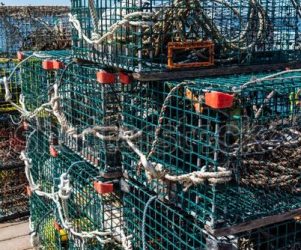
Massachusetts Marine Fisheries Advisory Commission bans inshore lobstering during whale migration
Meeting via webinar, the MFAC overwhelmingly approved five of the six recommendations presented by the state Division of Marine Fisheries, setting the stage for a hectic start to the state’s 2021 lobster fishing season.,, A Feb. 1 to May 15 closure to commercial trap gear in all state waters,, weaker buoy lines,, A Jan. 15 to May 15 gillnet closure in Cape Cod Bay,, All but one of the approved measures passed on unanimous 8-0 votes. The exception was the recommendation for the Feb. 1 to May 15 commercial trap gear closure in all state waters. The lone dissenting vote on the measure came from longtime Gloucester lobsterman Arthur “Sooky” Sawyer, “I can’t support this motion. The Massachusetts inshore lobster fishery has never killed a right whale. I’m voting no.” >click to read< 18:35
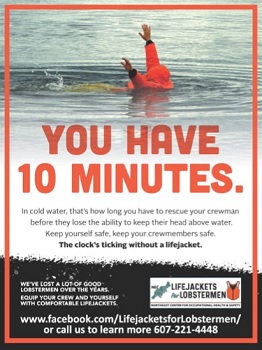
Lifejackets for Lobstermen Project works to get PFDs on every fisherman
From 2000-2016, the Centers for Disease Control charted 204 commercial fishing fatalities from falls overboard. None of the fishermen recovered were wearing a lifejacket, and 108 of the fishermen’s bodies were never found, according to a report of the Lifejacket Project, which was launched to identify solutions and increase fishermen’s interest in wearing lifejackets. In its recently published, 20-page summary report, the Northeast Center for Occupational Health and Safety in Agriculture, Forestry and Fishing chronicles stories from the Lifejackets for Lobstermen Project and provides examples of the fishing community’s interest and engagement with the project. >click to read< 05:46
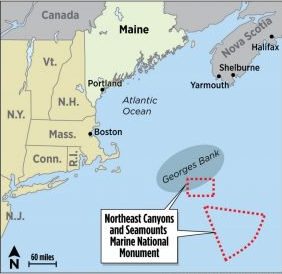
A legal war, a Biden win: What’s next for Northeast Canyons and Seamounts Marine National Marine Monument?
Lobstering groups say they aren’t opposed to protecting the natural habitats that sustain their industry. But they question whether the 5,000-square-mile monument is consistent with the Antiquities Act’s provision that designations be limited to the “smallest area compatible” with protecting the rich supply of marine life and corals that populate the Atlantic site. They also questioned the Obama administration’s position, which Trump officials have defended in court,,, Blocking off industry’s access to thousands of square miles of the Atlantic Ocean should require a little more public input, the fishing groups argue. Trump instead chose to preserve the site, although he traveled this summer to Maine to announce that he would lift all fishing restrictions in the monument.,, And in a matter of weeks, President-elect Joe Biden, who was vice president when Obama created the Atlantic monument, will be sitting in the White House. >click to read< 08:05









